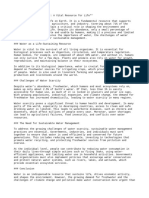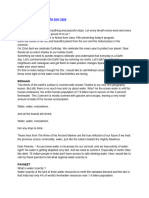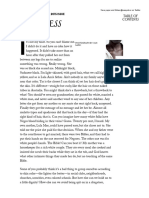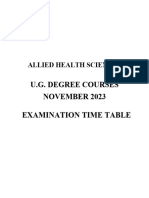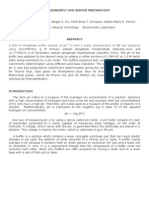Water Conservation
Water Conservation
Uploaded by
rrao48492Copyright:
Available Formats
Water Conservation
Water Conservation
Uploaded by
rrao48492Original Title
Copyright
Available Formats
Share this document
Did you find this document useful?
Is this content inappropriate?
Copyright:
Available Formats
Water Conservation
Water Conservation
Uploaded by
rrao48492Copyright:
Available Formats
The world has gone dry, people have commenced killing just for a drop
of water, and there is chaos everywhere. This might sound
hypothetical but it can be a reality in near future.
Good morning to the judges and all my dear friends. I am Master
Vrishin Rao from 10B and today I am going to share my viewpoint on
water conservation.
How can people fight over a drop of water? This might be your
question regarding the above situation, as we know water covers 70%
of the earth's surface. Well the fact is
Water does cover 70% of our planet, and it is easy to think that it will
always be plentiful. However, freshwater—the stuff we drink, bathe in,
and irrigate our farm fields with—is incredibly rare. Only 3% of the
world’s water is freshwater, and two-thirds of that is tucked away in
frozen glaciers or otherwise unavailable for our use.
To address the situation the concept the of water conservation came
into play
World Water Day, held on 22 March every year since 1993, focuses on the
importance of freshwater. The value of water is much more than its price –
water has enormous and complex value for our households, food, culture,
health, education, economics, and the integrity of our natural environment.
If we overlook any of these values, we risk mismanaging this finite,
irreplaceable resource. Without a comprehensive understanding of water’s true,
multidimensional value, we will be unable to safeguard this critical resource for
the benefit of everyone.
Today, water is under extreme threat from a growing population, increasing
demands of agriculture and industry, and the worsening impacts of climate
change.
We must learn to save water now for the future. The quality of our water is very
important. We have the same amount of water now as there was when the
earth was created and it is very important to realize that this is the water we
have, and we must preserve its quality
Water conservation programs are typically initiated at the local level or
community level, by either municipal water utilities or regional governments.
Common strategies for water conservation include public outreach
campaigns, tiered water rates by charging progressively higher prices as
water use increases, or restrictions on unnecessary use of water
The most important step in the direction of finding solutions to issues of water
conservation is to change people's attitudes and also changing habits which
include each one of us to put in some sincere efforts. We can follow some of
the simple things that contribute to water conservation, for an instance
Every drop of water counts, so make sure you are not wasting clean
drinking water and you are not leaving any running tap.
Remember to use only the amount you actually need and not wasting the
water unnecessarily.
Plant more and more trees to increase transpiration.
Encourage rainwater harvesting at the community level as well as
municipal level.
Do not leave the tap running while you are brushing your teeth or soaping
your face.
I would like to conclude by saying
We may run different programmes like water harvesting, dam projects etc
however it drills down to reducing water consumption as part of individual
responsibility and making it as a part of our DNA. Every drop that you save
counts so don't think that what you do doesn't matter. It takes just a small
amount of motivation and willingness to bring about a change which brings in
some great results and a huge amount of satisfaction.. If we all do our part in
conserving water, we can make a huge difference for the environment.
You might also like
- AL 391 X-Trema 3.5 (Manual)Document35 pagesAL 391 X-Trema 3.5 (Manual)taxydromos100% (2)
- Lecture-3-Water Conservation Need, Importance and Conservation MethodsDocument7 pagesLecture-3-Water Conservation Need, Importance and Conservation MethodsNahid Farzana 1610449630No ratings yet
- MU EssayDocument3 pagesMU EssayAbhiram KannaNo ratings yet
- Geo PresentationDocument15 pagesGeo PresentationflakeNo ratings yet
- Conserve WaterDocument3 pagesConserve Waterladehag299No ratings yet
- Save Water Save LifeDocument1 pageSave Water Save LifeRaven Chastity EncarnacionNo ratings yet
- Save WaterDocument2 pagesSave WaterSankhadip RangNo ratings yet
- Ansh Presentation 1Document6 pagesAnsh Presentation 1shivani bhaskarNo ratings yet
- Slidesgo Every Drop Counts The Art of Water Conservation 202411101711248t16Document9 pagesSlidesgo Every Drop Counts The Art of Water Conservation 202411101711248t16Dragon SlayerNo ratings yet
- Module 2 - Water ResourcesDocument26 pagesModule 2 - Water ResourcesDebasish DasNo ratings yet
- Geo Fa 2Document3 pagesGeo Fa 2naksha.s.999No ratings yet
- WaterDocument2 pagesWaterRohitNo ratings yet
- Rivers and Lakes Chemical Fertilizers: Reason For Freshwater ShortageDocument2 pagesRivers and Lakes Chemical Fertilizers: Reason For Freshwater ShortageEinah EinahNo ratings yet
- Solutions For Water Scarcity and ContaminationDocument3 pagesSolutions For Water Scarcity and ContaminationHam someNo ratings yet
- Article About Save WaterDocument3 pagesArticle About Save WaterretinaNo ratings yet
- Water ManagementDocument6 pagesWater ManagementShiva DhangeNo ratings yet
- Persuasive Text - Rosa - 20230120913019Document2 pagesPersuasive Text - Rosa - 20230120913019rosakyungsoo22No ratings yet
- Water Is A Chemical Compound With The Chemical Formula HDocument5 pagesWater Is A Chemical Compound With The Chemical Formula HHarsh WaliaNo ratings yet
- A Study Study Found Out That The Average Domestic Water Consumption of A Household Member Is 90Document2 pagesA Study Study Found Out That The Average Domestic Water Consumption of A Household Member Is 90Leiwin CastroNo ratings yet
- Water ConservationDocument7 pagesWater Conservationdipdesale07No ratings yet
- Essay On The Topic Water ConservationDocument2 pagesEssay On The Topic Water ConservationTejash Agarwal50% (2)
- Water ConservationDocument2 pagesWater Conservationvarun_smcetNo ratings yet
- Definition of WaterDocument6 pagesDefinition of Waterkara nekofuNo ratings yet
- Water Conservation TED X TalkDocument3 pagesWater Conservation TED X TalkIm XxPotatoNo ratings yet
- Water ProjectDocument15 pagesWater ProjectSuyash MaskeNo ratings yet
- Water ConservationDocument6 pagesWater ConservationPrince TanwarNo ratings yet
- Fresh Water Climate Change Manufacturing Water Utilities OutreachDocument6 pagesFresh Water Climate Change Manufacturing Water Utilities OutreachsingerNo ratings yet
- Save Water - How To Reduce Your Water Footprint - Digital For GoodDocument14 pagesSave Water - How To Reduce Your Water Footprint - Digital For GoodRaveNo ratings yet
- Saving WaterDocument1 pageSaving WaterdeinNo ratings yet
- Article 1Document2 pagesArticle 1Malika LarasatiNo ratings yet
- Speech On Save WaterDocument3 pagesSpeech On Save WaterReeha FarwinNo ratings yet
- WaterDocument1 pageWater10xyz.coderNo ratings yet
- Water ScarcityDocument1 pageWater ScarcityMarivic Bausa MojecaNo ratings yet
- WaterDocument2 pagesWaterThu Anh TruongNo ratings yet
- Unit I-Multidisciplinary Nature of Environmental Studies Scope and Importance, Need For Public AwarenessDocument3 pagesUnit I-Multidisciplinary Nature of Environmental Studies Scope and Importance, Need For Public AwarenessNidhin RajNo ratings yet
- Notas de Clase Sobre La Guerrra Clase de Introdcucción Ciencia PolíticaDocument3 pagesNotas de Clase Sobre La Guerrra Clase de Introdcucción Ciencia Políticajuan.ruaNo ratings yet
- La Crisis Del AguaDocument7 pagesLa Crisis Del Aguacjd0cxwj100% (1)
- Take Care The WáterDocument6 pagesTake Care The WáterVirginia MedinaNo ratings yet
- MainDocument5 pagesMainviona.feronicaNo ratings yet
- Water ConservationDocument6 pagesWater ConservationShubam SharmaNo ratings yet
- Demonstrasi Kontekstual - Teks Persuasif - Ana Lutvia Fitriyani - Bahasa InggrisDocument1 pageDemonstrasi Kontekstual - Teks Persuasif - Ana Lutvia Fitriyani - Bahasa Inggrisppg.khoiruanifa85No ratings yet
- The Importance of Water ConservationDocument1 pageThe Importance of Water ConservationmzingwaniorefileNo ratings yet
- Water PollutionDocument7 pagesWater PollutionkagbabuNo ratings yet
- Impact of Litter On River and Water Bodies in City EssayDocument4 pagesImpact of Litter On River and Water Bodies in City EssayBhavesh BhoeeNo ratings yet
- WaterDocument2 pagesWaterlabangnm09No ratings yet
- Water ResourcesDocument25 pagesWater ResourcesTalha TahirNo ratings yet
- Eng PRJDocument2 pagesEng PRJKim Michi 3No ratings yet
- Save ResourcesDocument4 pagesSave ResourcesPinkyFarooqiBarfiNo ratings yet
- World Water DayDocument1 pageWorld Water Dayhsn.1110dxbNo ratings yet
- LESSON PLAN Water ConservationDocument8 pagesLESSON PLAN Water ConservationkarlacamilledeleonNo ratings yet
- Water ConservationDocument4 pagesWater ConservationKamran ArshafNo ratings yet
- Nurturing NatureDocument2 pagesNurturing Natureariha.0509No ratings yet
- Text To SayDocument3 pagesText To Sayveentas1naidaxNo ratings yet
- Speech On WaterDocument2 pagesSpeech On WaterNURUL ADILLANo ratings yet
- Water ManagementDocument2 pagesWater ManagementJulius FernandesNo ratings yet
- Save Water EssayDocument2 pagesSave Water Essaysongspk100No ratings yet
- World Water Day 2020Document3 pagesWorld Water Day 2020THOPUDURTHY GAYATHRINo ratings yet
- Alisha and Ichcha: Presentation On Earth Day 2024Document5 pagesAlisha and Ichcha: Presentation On Earth Day 2024DARKBOI GAMERopNo ratings yet
- Assignment: NameDocument4 pagesAssignment: NameAbdul HaqNo ratings yet
- Climathon ChallengeDocument2 pagesClimathon ChallengeFrederic BachtoovenNo ratings yet
- Water Conservation For Beginners: A Step-By-Step Guide On How To Capture, Conserve, and Reuse Water For A Sustainable LivingFrom EverandWater Conservation For Beginners: A Step-By-Step Guide On How To Capture, Conserve, and Reuse Water For A Sustainable LivingNo ratings yet
- A Detailed Lesson Plan in RizalDocument12 pagesA Detailed Lesson Plan in RizalDaryll Hannah Escoreal100% (2)
- CC202 Critical Reflection Paper #2Document2 pagesCC202 Critical Reflection Paper #2spencerossullivanNo ratings yet
- 24 Hours CycleDocument14 pages24 Hours CycleigorNo ratings yet
- "Sweetness" - The New YorkerDocument6 pages"Sweetness" - The New Yorkernastynate800No ratings yet
- Chapter 2: The Chemical Context of LifeDocument11 pagesChapter 2: The Chemical Context of LifeDan JohnsonNo ratings yet
- Chemistry 12 MidtermDocument12 pagesChemistry 12 Midtermmauryaharshit410No ratings yet
- AHS UG Timetable Nov2023Document35 pagesAHS UG Timetable Nov2023james9122000aNo ratings yet
- Chapter 2 Lesson 2 (Part 1)Document3 pagesChapter 2 Lesson 2 (Part 1)audrich carlo agustinNo ratings yet
- ORGANON OF MEDICINE A 13 To 16Document3 pagesORGANON OF MEDICINE A 13 To 16ashikNo ratings yet
- Character and Behaviour: A. MakeDocument4 pagesCharacter and Behaviour: A. MakeYen Linh NguyenNo ratings yet
- Os-Wtr Dams-Published Papers FinalDocument2 pagesOs-Wtr Dams-Published Papers FinalAnonymous T02GVGzBNo ratings yet
- KAM SR Sample Receiver: User GuidelinesDocument3 pagesKAM SR Sample Receiver: User GuidelinesGibran TorresNo ratings yet
- 7TH ScienceDocument2 pages7TH ScienceMuhammad Qadir RafiqueNo ratings yet
- Gangrene: Unit-I Veterinary Pathology (Paper-I)Document8 pagesGangrene: Unit-I Veterinary Pathology (Paper-I)Ajinkya JadhaoNo ratings yet
- Fire Fighting CatalogDocument6 pagesFire Fighting CatalogTangin YeanNo ratings yet
- DDS 1 - DDS 4: DDS (G) DDS (G)Document12 pagesDDS 1 - DDS 4: DDS (G) DDS (G)gdbuNo ratings yet
- Merchandising Staff TrainingDocument19 pagesMerchandising Staff Trainingjane mcgettiganNo ratings yet
- PH Measurement and Buffer PreparationDocument7 pagesPH Measurement and Buffer PreparationAnna Donato100% (8)
- Fulltext 12088 PDFDocument83 pagesFulltext 12088 PDFWilbert FatahNo ratings yet
- Full Chapter Envisioning Embodiment in The Health Humanities 1St Edition Jodi Cressman PDFDocument53 pagesFull Chapter Envisioning Embodiment in The Health Humanities 1St Edition Jodi Cressman PDFalfred.thomas359No ratings yet
- The Last Sheet.: Ronnie D. Caringal Canubing National High SchoolDocument5 pagesThe Last Sheet.: Ronnie D. Caringal Canubing National High SchoolMhelds ParagsNo ratings yet
- 6.1. Carry The VictimDocument12 pages6.1. Carry The VictimEkin ShekinNo ratings yet
- Halal Assurance LetterDocument5 pagesHalal Assurance LetterLuân LêNo ratings yet
- Science 7 Performance Task #1 (2Nd Quarter) (MODULE 1 & 2)Document1 pageScience 7 Performance Task #1 (2Nd Quarter) (MODULE 1 & 2)Alvin GultiaNo ratings yet
- 300 21Document3 pages300 21Christian JohnsonNo ratings yet
- 2 PFTDocument32 pages2 PFTMarceline GarciaNo ratings yet
- Charismatics Counterfeit RevivalDocument82 pagesCharismatics Counterfeit Revivalthelightheartedcalvinist6903100% (1)
- Adoption, Family Ideology, and Social StigmaDocument8 pagesAdoption, Family Ideology, and Social StigmaAbdi ChimdoNo ratings yet
- Capacitance Type Level Transmitter in IndiaDocument11 pagesCapacitance Type Level Transmitter in IndiaTrumen Technologies PVT LtdNo ratings yet












































